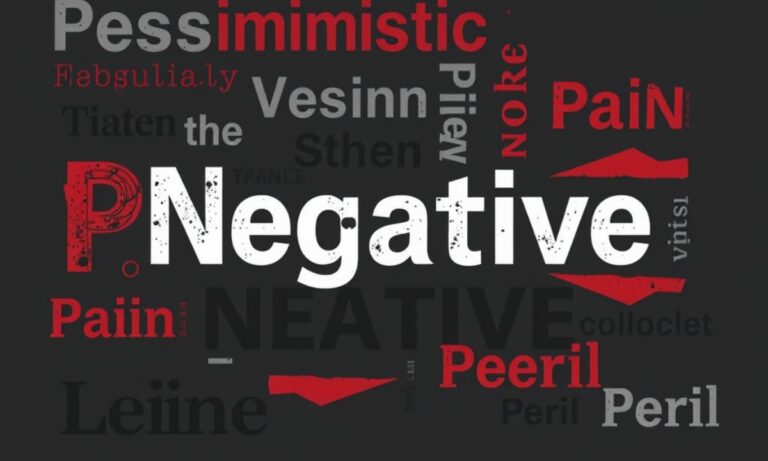The letter “P” offers an extensive collection of negative words that can dramatically enhance your communication and writing.
These 600+ words have been meticulously categorized to help you quickly find the perfect term for any situation requiring negative description or criticism.
From common words like “painful” and “problematic” to more specific terms like “pernicious” and “patronizing,” this comprehensive list serves as an excellent resource for writers, speakers, educators, and language enthusiasts.
Understanding these negative P-words can help you express disapproval with greater precision, create more convincing antagonists in storytelling, or simply expand your vocabulary with powerful terms that capture specific negative qualities.
Whether you’re writing a critical essay, crafting dialogue for a villain, or seeking to articulate criticism more effectively, this collection provides the linguistic tools you need.
Poverty, Poisonous, Painful
These three powerful P-words exemplify how single terms can capture profound negative concepts that resonate deeply in human experience.
“Poverty” extends beyond mere financial scarcity to represent deprivation in multiple aspects of life, including poverty of opportunity, spirit, and resources.
“Poisonous” describes not only literal toxins but also relationships, environments, and ideologies that gradually deteriorate well-being through their harmful influence. “Painful” encompasses both physical suffering and emotional anguish, making it versatile for describing everything from minor discomforts to profound trauma.
These versatile terms demonstrate how negative P-words effectively communicate multifaceted unpleasant experiences that many people immediately understand on both intellectual and emotional levels.
The power of these three words lies in their ability to evoke strong responses while remaining simple enough to be universally recognized across different contexts and situations.
Negative Adjectives That Start With P
Negative P-adjectives provide writers and speakers with precise tools to describe unfavorable qualities in people, situations, objects, or abstract concepts.
Words like “pedantic” (excessively concerned with minor details) and “patronizing” (treating others condescendingly) help communicate specific criticisms rather than relying on vague negative terms.
These descriptors range from mild criticisms like “pedestrian” (lacking imagination) to severe condemnations such as “pathological” (compulsive and unhealthy) or “pernicious” (causing insidious harm).
Using these targeted adjectives enhances writing by creating more accurate portrayals of negative characteristics, allowing readers to visualize exactly what makes something objectionable or problematic.
The strategic application of negative P-adjectives can transform generic criticism into precise feedback, making your communication more effective and impactful.
For creative writers, these adjectives help develop nuanced antagonists or describe challenging situations with greater emotional resonance.
- Pathetic
- Punitive
- Petty
- Pugnacious
- Pompous
- Pessimistic
- Pitiful
- Pretentious
- Pernicious
- Peevish
- Patronizing
- Perfidious
- Petulant
- Possessive
- Pedantic
- Perverse
- Prickly
- Prudish
- Parasitic
- Partisan
- Puzzling
- Paranoid
- Pushy
- Passive-aggressive
- Plagued
- Prejudiced
- Powerless
- Painful
- Poisonous
- Phony
- Predatory
- Presumptuous
- Problematic
- Precarious
- Paltry
- Poor
- Pitiless
- Preposterous
- Profane
- Prying
- Perilous
- Pointless
- Provocative
- Pathological
- Pigheaded
- Puerile
- Puny
- Putrid
- Penurious
- Perplexing
- Provocative (repeated from #43)
- Panicky
- Perverted
- Passionless
- Prissy
- Pilfering
- Porous
- Pallid
- Painstaking
- Pestilent
Negative Adverbs That Begin With P
Negative P-adverbs modify actions, adjectives, or other adverbs by adding layers of negativity to descriptions, enhancing how readers understand the manner in which something occurs.
Terms like “pridefully” (with excessive self-importance), “presumptuously” (overstepping boundaries), and “punitively” (with intent to punish) illustrate harmful or unpleasant ways actions can be executed, adding nuance to descriptions.
These adverbs transform ordinary verbs into more powerful expressions by indicating exactly how an action becomes problematic – someone might speak “patronizingly,” move “ponderously,” or judge “prejudicially.”
Writers who incorporate these adverbs show rather than tell, demonstrating precisely how behaviors manifest negatively rather than making general claims about character or intent.
P-adverbs ending in “-ly” are particularly effective for creating vivid scenes where readers can almost feel the uncomfortable atmosphere or tension between characters.
Using these adverbs strategically helps writers avoid overusing negative adjectives while still creating text rich with negative connotation and emotional impact.
- Painfully
- Pathetically
- Poorly
- Pessimistically
- Precariously
- Perilously
- Pompously
- Perfunctorily
- Petulantly
- Punitively
- Patronizingly
- Pretentiously
- Pitifully
- Passively
- Pedantically
- Perversely
- Prickly
- Prejudicially
- Provocatively
- Presumptuously
- Problematically
- Pettily
- Painstakingly
- Putridly
- Pointlessly
- Peevishly
- Pugnaciously
- Parasitically
- Pitilessly
- Preposterously
- Profanely
- Pryingly
- Perniciously
- Perilously
- Pressingly
- Painedly
- Plagueily
- Powerlessly
- Poisonously
- Passionlessly
- Primitively
- Precariously
- Paradoxically
- Partially
- Ponderously
- Possessively
- Persistently
- Pugnaciously
- Paltry
- Passively-aggressively
- Peremptorily
- Perfidiously
- Perplexingly
- Piously
- Pushily
- Prudishly
- Plaintively
- Prohibitively
- Plaintively
- Prosaically
- Predictably
- Piercingly
- Purposelessly
- Prematurely
- Precariously
- Punitively
- Precipitously
- Profligately
- Parsimoniously
- Peripherally
- Placidly
- Posthumously
- Petulantly
- Ponderously
- Primitively
- Plaguily
- Profoundly
- Pathologically
- Periodically
- Peculiarly
Obscure Words That Start With The Letter P
Obscure negative P-words offer sophisticated alternatives to common negative terms, elevating both written and spoken language with their precision and historical depth.
Words like “plebeian” (common or vulgar), “penury” (extreme poverty), and “perfidious” (deceitful and untrustworthy) carry specific negative connotations that more familiar words might not capture as effectively.
These less common terms often contain rich etymological histories that add layers of meaning – for instance, “pusillanimous” (showing ignoble cowardice) comes from Latin roots meaning “very small spirit.”
Incorporating obscure P-words into your vocabulary demonstrates linguistic sophistication while providing more nuanced ways to express criticism, disapproval, or negative situations.
For academic writing or literary works, these terms can help establish a formal tone while precisely communicating complex negative concepts that might otherwise require multiple sentences to explain.
Writers who master these obscure terms gain access to centuries of negative connotations packaged in single, powerful words that can captivate readers with their unfamiliarity and specificity.
- Pandiculation
- Petrichor
- Psithurism
- Patulous
- Plangent
- Palimpsest
- Pablum
- Pernoctation
- Pachycephalic
- Pauciloquent
- Persiflage
- Pecksniffian
- Pullulate
- Peregrine
- Prelapsarian
- Perspicacious
- Pavonine
- Pawky
- Philematology
- Pococurante
- Pollicitation
- Perforce
- Perendinate
- Psellism
- Puerperium
- Paleolimnology
- Psilanthropism
- Pudency
- Purblind
- Pecuniary
- Pyxidium
- Pyknic
- Prolegomenon
- Postprandial
- Procellous
- Prurient
- Pusillanimous
- Parvenu
- Pellucid
- Prestidigitation
- Pulchritudinous
- Pleonasm
- Philter
- Phlegmatic
- Philippic
- Proscenium
- Parapraxis
- Pettifogger
- Palaver
- Prolix
- Parietal
- Pulverulent
- Piscatory
- Probity
- Periphrasis
- Perfervid
- Peroration
- Propinquity
- Perdurable
- Parataxis
- Phantasmagoria
- Piquant
- Pilgrimage
- Polemology
- Panegyric
- Pogonotrophy
- Propitious
- Pericope
- Penumbra
- Plenipotentiary
- Perspicuity
- Praxis
- Puissant
- Panopticon
- Poetaster
- Pyknolepsy
- Psychopomp
- Polyglot
- Paronomasia
- Prosopagnosia
- Pabulation
- Procrustean
- Putative
- Prandial
- Pontification
- Paraleipsis
- Phalanx
- Pareidolia
- Peccadillo
- Pasquinade
- Polysyndeton
- Palingenesis
- Pansophy
- Piblokto
- Philodox
- Phantasmagorical
- Pulchritude
- Prosody
- Paleoecology
- Pettifoggery
Negative Words That Begin With P To Describe A Person
When describing someone’s negative traits, P-words offer remarkably specific vocabulary for various character flaws, allowing for precise criticism or character development.
“Pernicious” describes someone whose subtle harmful influence gradually damages others, while “pretentious” captures those who affect greater importance or knowledge than they truly possess. “Paranoid,” “petty,” and “pusillanimous” each pinpoint distinct personality shortcomings that affect how people interact with others and navigate social situations.
These descriptors help writers craft multidimensional antagonists with realistic flaws rather than cartoonish villains, creating more compelling narratives that readers find believable and engaging.
In interpersonal communication, these targeted words can provide specific feedback about problematic behaviors without resorting to generic insults that might be dismissed or misunderstood.
Understanding these negative personality descriptors also helps individuals recognize potentially problematic traits in themselves, potentially leading to greater self-awareness and personal growth.
- Pompous
- Pretentious
- Pushy
- Petty
- Patronizing
- Petulant
- Passive-aggressive
- Paranoid
- Prickly
- Pessimistic
- Pitiful
- Pugnacious
- Prejudiced
- Presumptuous
- Perfidious
- Pathetic
- Pedantic
- Perverted
- Possessive
- Psychotic
- Prideful
- Peculiar
- Priggish
- Predatory
- Pathological
- Puritanical
- Procrastinating
- Pernicious
- Parasitic
- Pompous
- Phony
- Pallid
- Peevish
- Pigheaded
- Panicky
- Penurious
- Puny
- Pretentious
- Perfunctory
- Precocious
- Perverse
- Procrastinator
- Profligate
- Profane
- Puerile
- Prissy
- Prim
- Prudish
- Pontificating
- Prevaricating
- Provoking
- Parsimonious
- Pilfering
- Problematic
- Presuming
- Pickpocketing
- Placating
- Prying
- Pouty
- Preposterous
- Plodding
- Plundering
- Punctilious
- Peremptory
- Parasitical
- Posturing
- Pontifical
- Punitive
- Perfidious
- Pouting
- Pusillanimous
- Prodigal
- Paltry
- Pitiful
- Polluted
Avoid These Negative P Words
This category highlights particularly harsh or offensive P-words that should be used with extreme caution due to their potential to cause genuine harm in certain contexts.
Terms like “piranha” (when used to describe predatory people) and “phony” (indicating inauthentic behavior) can be deeply hurtful when directed at individuals, damaging self-esteem and relationships.
Many words in this category include profanity, slurs, and demeaning labels that can perpetuate stereotypes or cause lasting emotional damage when used carelessly or maliciously.
Understanding which negative P-words cross the line from critique to cruelty helps communicators recognize appropriate boundaries and choose more constructive alternatives when expressing disapproval or criticism.
In professional settings, avoiding these highly negative terms prevents workplace hostility and potential harassment issues that could arise from language perceived as aggressive or demeaning. For writers, knowing these boundaries helps create authentic dialogue without unnecessarily offending readers, allowing for realistic portrayal of conflict without endorsing harmful language.
- Pathetic
- Pessimistic
- Problematic
- Pitiful
- Paralyzing
- Petty
- Pompous
- Punitive
- Painful
- Poisonous
- Passive-aggressive
- Pretentious
- Paranoid
- Prickly
- Pedantic
- Petulant
- Petulant
- Prejudiced
- Putrid
- Perverted
- Phony
- Perfidious
- Pusillanimous
- Pernicious
- Psychotic
- Presumptuous
- Pathological
- Peevish
- Pugnacious
- Possessive
- Predatory
- Patronizing
- Procrastinating
- Pushy
- Prying
- Profane
- Pointless
- Prudish
- Pigheaded
- Petulant
- Prissy
- Primitive
- Powerless
- Poor
- Peculiar
- Puritanical
- Paltry
- Puerile
- Perplexing
- Precarious
- Perilous
- Plodding
- Provocative
- Prohibitive
- Plaguing
- Punishing
- Parasitic
- Preposterous
- Pitiless
- Polluted
- Parochial
- Penny-pinching
- Passive
- Pesky
- Perturbing
- Perfunctory
- Plaintive
- Platitudinous
- Ponderous
- Profligate
- Prohibitive
- Prosaic
- Protracted
- Pulverizing
- Predictable
- Penurious
- Perverse
- Putrid
- Pontificating
- Prevaricating
Negative Feelings And Emotions That Start With The Letter P
P-words effectively capture various negative emotional states across the spectrum from mild discomfort to intense psychological distress.
“Petrified” describes paralyzing fear that renders someone immobile, while “pensive” indicates a worried thoughtfulness that prevents full engagement with the present.
“Piqued” suggests irritation or wounded pride in social situations, and “powerless” conveys the devastating feeling of having no control over important outcomes.
Having precise vocabulary for negative emotions helps individuals better understand and communicate their experiences, potentially leading to more effective emotional processing and clearer communication with therapists, loved ones, or support networks.
For writers, these emotional terms create more authentic characters whose internal experiences readers can recognize and relate to, strengthening the emotional impact of narratives.
Understanding these nuanced emotional terms can also help people recognize and name their feelings more accurately, which psychology research suggests is an important first step in managing difficult emotions constructively.
- Pain
- Panic
- Paranoia
- Pessimism
- Petulance
- Perplexity
- Peevishness
- Pity
- Prejudice
- Powerlessness
- Pettiness
- Persecution
- Perturbation
- Phobia
- Pressure
- Pensiveness
- Possessiveness
- Pomposity
- Prickliness
- Piteousness
- Pushiness
- Passivity
- Paralysis
- Perversity
- Poutiness
- Prudishness
- Pugnacity
- Puzzlement
- Perfunctoriness
- Preoccupation
- Punitiveness
- Presumptuousness
- Parsimony
- Pretentiousness
- Peculiarity
- Petrifaction
- Poignancy
- Punctiliousness
- Provocation
- Piercing
- Prissiness
- Puerility
- Putridity
- Panic-stricken
- Penitence
- Persecution complex
- Pique
- Ponderousness
- Purgatory
- Pendulousness
Depressed Words That Start With P
Words like “powerlessness,” “pessimism,” and “purgatory” specifically relate to depressive states and experiences, capturing the profound psychological burden these conditions place on individuals.
These terms effectively communicate the heaviness, hopelessness, and helplessness often associated with depression, allowing those suffering to articulate experiences that might otherwise feel inexpressible or isolating.
“Penury” describes not just financial poverty but the spiritual emptiness that can accompany depression, while “perturbation” captures the unsettled anxiety that often accompanies depressive episodes.
Understanding this specialized vocabulary can help individuals recognize symptoms in themselves or others, potentially encouraging earlier intervention or greater empathy for those struggling with mental health challenges.
For writers portraying characters with depression, these words provide authentic language that avoids clichés while accurately representing the complex internal experience of depressive states.
Mental health professionals and support persons can use these terms to better understand the subjective experience of depression, improving therapeutic communication and support.
- Pain
- Pathetic
- Pessimistic
- Painful
- Pitiful
- Powerless
- Perpetual
- Pallid
- Paralyzing
- Pensive
- Pessimism
- Purgatory
- Plight
- Pointless
- Punishing
- Piteous
- Perturbed
- Psychological
- Plagued
- Passionless
- Pitiable
- Paucity
- Poignant
- Problematic
- Prostrate
- Pressured
- Phlegmatic
- Plummeting
- Pained
- Persecuted
- Paralyzed
- Paltry
- Perfunctory
- Pleasureless
- Plodding
- Poor
- Punishing
- Penurious
- Petrified
- Plaintive
- Perverse
- Periphery
- Panic-stricken
- Pale
- Preoccupied
- Perturbed
- Purposeless
- Pendulous
- Purgatorial
- Prolonged
Non-Verbal Words That Start With P
This unique category explores physical objects or symbols beginning with P that carry negative associations in various contexts or for different individuals.
Items like “police badge” might evoke fear or anxiety for those with traumatic experiences involving law enforcement, while “poker chips” could trigger negative memories for someone affected by gambling addiction.
Common objects like “padlocks,” “prisons,” and “pills” can symbolize restriction, punishment, or dependency in artistic or literary contexts, adding powerful visual elements to creative works.
Understanding how symbols and objects affect perception helps communicators consider context and audience when incorporating imagery into their work, whether writing fiction, creating visual art, or designing physical spaces.
This awareness enhances sensitivity in communication and deepens understanding of how non-verbal elements influence emotional responses, particularly important for advertisers, designers, and others working with visual communication.
Recognizing these negative symbolic associations allows communicators to either avoid unintentionally triggering negative reactions or deliberately use these symbols to evoke specific emotional responses from their audience.
- Posture
- Pose
- Position
- Pointing
- Pout
- Proximity
- Pupil dilation
- Palm gesture
- Placement
- Pantomime
- Pause
- Pacing
- Pivot
- Prosody
- Paralanguage
- Pursed lips
- Perky
- Prostration
- Poker-face
- Personal space
- Puffing
- Physical touch
- Pushing
- Pulling
- Presence
- Peeking
- Preening
- Prancing
- Patting
- Petting
- Pounding
- Pinching
- Punching
- Palming
- Positioning
- Presentation
- Performance
- Perspective
- Percussion
- Pursing
- Praying hands
- Propping
- Postural shift
- Phototropism
- Proxemics
- Puckering
- Peering
- Prodding
- Poking
- Prowling
- Poising
- Pensive look
- Prideful stance
- Pensive posture
- Passive stance
- Playful gesture
- Parading
- Physical mimicry
- Planting feet
- Protective stance
- Puzzled expression
- Prolonged gaze
- Peaceful gesture
- Pressing lips
- Propelling
- Projecting
- Parading
- Passive resistance
- Physical demonstration
- Power pose
Halloween Words That Start With P
The spooky season brings numerous negative P-words associated with fear and the macabre, perfect for creating eerie atmospheres in Halloween-themed writing, decorations, or entertainment.
Terms like “phantom,” “possession,” “poltergeist,” and “psycho” tap into primal fears while maintaining the playful spirit associated with this holiday that celebrates the frightening and supernatural.
“Pumpkin” itself transforms from an ordinary vegetable to a symbol of the supernatural when carved into a jack-o’-lantern, demonstrating how context can shift even neutral P-words into the realm of the spooky or sinister.
Halloween-specific terms like “paranormal investigator” and “phantom ship” create richly detailed spooky scenarios that enhance seasonal storytelling, haunted house descriptions, or costume party invitations.
These words help create the perfect balance of playful fright and genuine creepiness associated with Halloween traditions, allowing people to explore fear in a controlled, entertaining context.
For writers of horror or supernatural fiction, these Halloween P-words provide specialized vocabulary that immediately establishes mood and sets expectations for readers looking for thrilling, spine-tingling content.
- Pumpkin
- Phantom
- Poltergeist
- Paranormal
- Possession
- Psychic
- Petrifying
- Panic
- Paralyzing
- Prowling
- Predator
- Potion
- Pallid
- Phobia
- Pentagram
- Possession
- Portal
- Putrid
- Premonition
- Plague
- Pestilence
- Poison
- Pendulum
- Peril
- Presage
- Pain
- Perish
- Psychopath
- Paranoia
- Power
- Purgatory
- Pact
- Pustules
- Preternaturally
- Plasmic
- Prediction
- Prophecy
- Pyrokinesis
- Posthumous
- Parapsychology
- Possessed
- Puppetmaster
- Pale
- Purification
- Psychopomp
- Perdition
- Pyre
- Profane
- Putrefy
- Punishment
- Panic-stricken
- Petrification
- Pandemonium
- Psychometry
- Pagan
More P Words
This section provides additional negative P-words that don’t fit neatly into other categories but still offer valuable vocabulary for expressing negativity across various contexts and situations.
These versatile words include terms like “peckish” (irritable due to hunger), “precipitately” (with dangerous haste), and “prayingly” (with desperate hope), covering different parts of speech and levels of severity.
Having access to this expanded vocabulary allows communicators to choose precisely the right term for any negative situation or description, enhancing both precision and emotional impact in expression.
The diversity of these words demonstrates the remarkable range of negative concepts that can be expressed beginning with just one letter of the alphabet, highlighting the richness of English vocabulary for describing unpleasant experiences, qualities, or situations.
For students, writers, and language enthusiasts, these additional words provide further opportunities to enhance vocabulary and express negativity with greater nuance and specificity.
Understanding these less categorizable negative P-words completes your vocabulary toolkit, ensuring you’re never at a loss for the perfect negative term regardless of context.
- Peaceful
- Perfect
- Practical
- Professional
- Productive
- Profound
- Perpetual
- Passionate
- Plentiful
- Positive
- Pristine
- Promising
- Precise
- Paramount
- Poetic
- Prosperity
- Punctual
- Patience
- Pleasing
- Priority
- Panoramic
- Phenomenal
- Pragmatic
- Powerful
- Proactive
- Precious
- Playful
- Progressive
- Perceptive
- Personable
- Philanthropic
- Prolific
- Principled
- Picturesque
- Prosperous
- Persistent
- Pioneering
- Purposeful
- Praiseworthy
- Polished
- Perceptible
- Persuasive
- Propitious
- Pensive
- Painstaking
FAQ’s
What are some commonly used negative words that start with P?
Pathetic, problematic, painful, pessimistic, and pretentious are frequently used negative P-words in everyday communication that effectively express disapproval or criticism.
How can negative P-words enhance my writing?
Negative P-words provide precise terminology to create more vivid descriptions, develop complex characters, and convey specific criticisms without relying on generic terms that lack impact or clarity.
Are there professional contexts where negative P-words should be avoided?
In professional feedback or workplace communication, avoid harsh P-words like “pathetic” or “pitiful” and instead use constructive alternatives like “needs improvement” or specific action-oriented feedback that doesn’t damage morale.
What’s the difference between “pessimistic” and “pragmatic”?
Pessimistic involves assuming negative outcomes regardless of evidence and focuses on what could go wrong, while pragmatic means being practical and realistic based on actual circumstances without necessarily assuming the worst.
How can I use negative P-words without sounding overly harsh?
Pair negative P-words with specific examples and constructive suggestions, use “I” statements rather than accusations, consider the context and relationship before choosing particularly strong negative terms, and balance criticism with recognition of positive aspects.
READ MORE: https://fashiongravity.co.uk/negative-words-that-begin-with-the-letter-g/
Conclusion
Expanding your vocabulary with negative P-words offers remarkable benefits for both writers and everyday communicators seeking to express themselves with greater precision and impact.
These words provide unparalleled specificity when describing unfavorable situations, delivering constructive criticism, or developing complex characters with believable flaws.
By mastering this negative vocabulary, you gain powerful linguistic tools to express disapproval or discontent with accuracy and nuance, avoiding vague generalizations that might be easily misinterpreted or dismissed by your audience.
The strategic use of negative P-words demonstrates linguistic sophistication while enabling more effective communication across personal, professional, and creative contexts.
Whether you’re crafting professional feedback that motivates improvement, developing literary antagonists with depth and believability, writing persuasive content about societal problems, or simply seeking to express yourself more precisely in daily conversation, this collection of 600+ negative P-words serves as an invaluable resource.
Remember that the true power of these words lies not just in their negativity, but in their ability to pinpoint

I’m Irfan, an experienced SEO content and SEO specialist with 2 years of expertise, currently contributing to Al Jazeera News Website.





